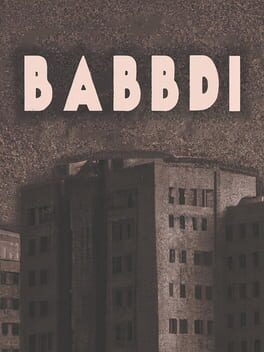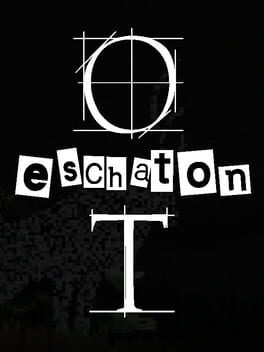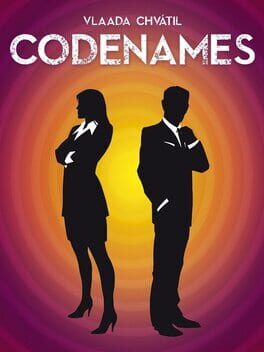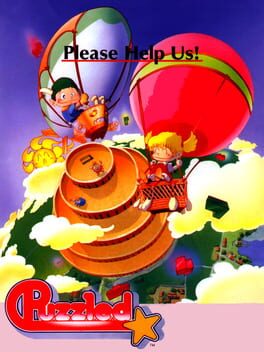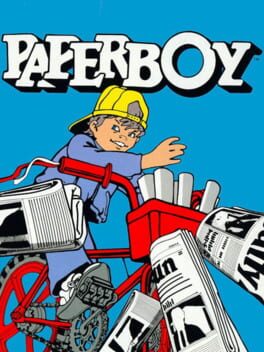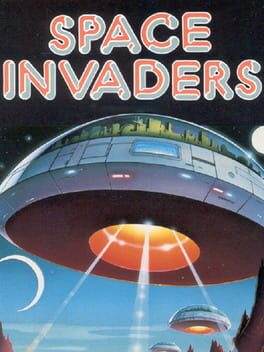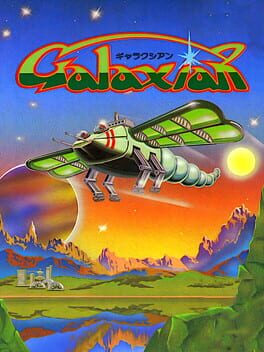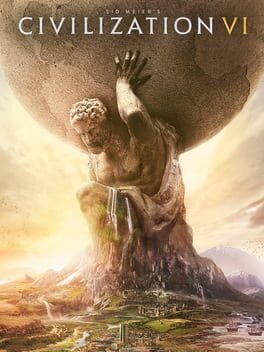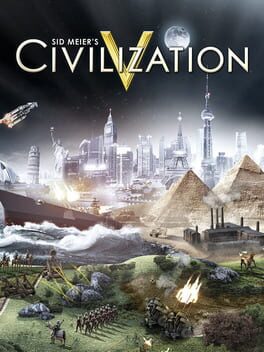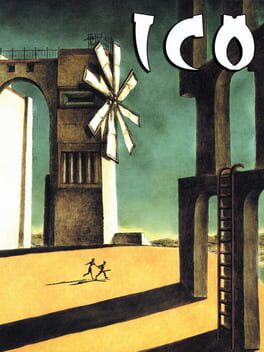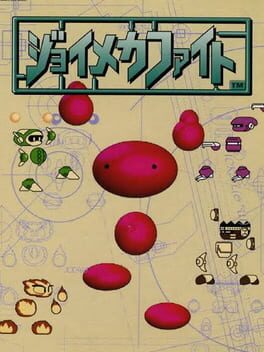Chariot_Rider
2006
Chuzzle is an extremely ok puzzle game. It's a match 3 style game where you drag rows to complete sets of colored chuzzles. You can identify moves that will cause combos when chuzzles of different colors fall into place, but in this case it feels like those matches are very incidental and reliant on the game spawning the right colors of chuzzle. Its not unenjoyable to make these combos, but rounds can go on for so long that the gameplay loop becomes a bit tiresome. My first run of Chuzzle lasted for 80 minutes, and admittedly I'm not the fastest player but by the end of that 80 minutes I was very ready for things to be over. I think part of the issue is that I don't find its loss condition to be very compelling. It's the same loss condition that Bejeweled uses, where a game is over once you can't make any more moves. It makes sense, and in Bejeweled it's easier to end up in a no move situation, but its not exactly a loss condition that has a lot of tension. It doesn't have the slowly encroaching doom of something like Tetris of Zuma. Chuzzle does gradually lock up your chuzzles, preventing you from moving certain rows and columns. That does add some tension back to the game, but it's a threat that can be worked around by making certain matches.
Overall, I think Chuzzle its fine, as in its not unenjoyable. It has some fun twists on this style of game, and some of its ideas are pretty neat. It's worth a play if you are into puzzle games if you can get it cheap.
Overall, I think Chuzzle its fine, as in its not unenjoyable. It has some fun twists on this style of game, and some of its ideas are pretty neat. It's worth a play if you are into puzzle games if you can get it cheap.
2022
Babbdi is a beautiful expression about the beauty and tragedy of decay. Everyone in this game feels stuck. An old lady struggles with her groceries, clearly overencumbered. She never moves. The architecture itself is her enemy. Everyone here is stuck, and it impacts everyone differently, and everyone copes in their own way.
The architectural stylings of Babbdi are spectacular. This game nails the aura of brutalism, with its towering concrete structures that feel imposing. Its a projection of power, not in opulence, but in raw geometric forms. Personally, I love brutalist architecture because I never entirely know how it makes me feel. I can't flatly say it's pleasant, nor can I say that its entirely dislikable, and thus I am constantly navigating my own thoughts on this artistic style that fill me with awe and dread and amazement and sadness. Babbdi is perhaps the greatest expression of brutalism ever put into a video game. Because I am fascinated by brutalism, the world of Babbdi speaks powerfully to me. The city feels huge, but not repetitive. Every corner of this place feels like its own thing, which is remarkable when you consider how much of this world is made out of concrete.
Part of why these spaces feel so memorable is the game's item system. You can only carry one item at a time, and while there are useful movement items you can find, you can only carry one at a time. I found myself swapping to new equipment all the time, and each one opened up new opportunities to traverse these spaces in their own way. It makes the joys of exploration so satisfying, because you want to find all of the cool movement items, and once you get some powerful tech, you have a greater ability to explore the intriguing nooks and crannies that caught your attention before you could reach them.
Babbdi is a game about hope, longing, struggle, and the price of these things, and I highly encourage playing this game.
The architectural stylings of Babbdi are spectacular. This game nails the aura of brutalism, with its towering concrete structures that feel imposing. Its a projection of power, not in opulence, but in raw geometric forms. Personally, I love brutalist architecture because I never entirely know how it makes me feel. I can't flatly say it's pleasant, nor can I say that its entirely dislikable, and thus I am constantly navigating my own thoughts on this artistic style that fill me with awe and dread and amazement and sadness. Babbdi is perhaps the greatest expression of brutalism ever put into a video game. Because I am fascinated by brutalism, the world of Babbdi speaks powerfully to me. The city feels huge, but not repetitive. Every corner of this place feels like its own thing, which is remarkable when you consider how much of this world is made out of concrete.
Part of why these spaces feel so memorable is the game's item system. You can only carry one item at a time, and while there are useful movement items you can find, you can only carry one at a time. I found myself swapping to new equipment all the time, and each one opened up new opportunities to traverse these spaces in their own way. It makes the joys of exploration so satisfying, because you want to find all of the cool movement items, and once you get some powerful tech, you have a greater ability to explore the intriguing nooks and crannies that caught your attention before you could reach them.
Babbdi is a game about hope, longing, struggle, and the price of these things, and I highly encourage playing this game.
2022
The most interesting things about Escaton are easy to miss. There are some interesting environmental details to pick up on that aren't immediately obvious, like how each of the figures you find is also represented in a painting inside the mansion, or how the painting by the lake changes after the horses rise from the water, reflecting the new state of the lake.
The sound design is also really good. The most unsettling moments in this game are carried by the audio, which genuinely got under my skin at points. It really helps carry the game's atmosphere.
If you want a vibe, this is an alright game to check out. The actual plot left me a bit confused. I think I follow what happened, but I am not entirely sure what it means, or what I as the player am supposed to take away from it. Pretty much all of the dialogue in the game is spoken in riddles about philosophy and existence, and that sort of writing can work pretty well in concert in a larger work, but for a short game like this I find there isn't quite enough to contextualize it. I didn't really get the writing, and even now its hard for me to remember the proverbs. I still enjoyed the game, though I think its strongest as a mood piece, or as an exploration in level design. Its worth looking into if you can snag it on sale.
The sound design is also really good. The most unsettling moments in this game are carried by the audio, which genuinely got under my skin at points. It really helps carry the game's atmosphere.
If you want a vibe, this is an alright game to check out. The actual plot left me a bit confused. I think I follow what happened, but I am not entirely sure what it means, or what I as the player am supposed to take away from it. Pretty much all of the dialogue in the game is spoken in riddles about philosophy and existence, and that sort of writing can work pretty well in concert in a larger work, but for a short game like this I find there isn't quite enough to contextualize it. I didn't really get the writing, and even now its hard for me to remember the proverbs. I still enjoyed the game, though I think its strongest as a mood piece, or as an exploration in level design. Its worth looking into if you can snag it on sale.
2020
Codenames is a fun game that really emphasizes lateral thinkers who can make unique connections between words, and risk takers who trust their team to put the pieces together. There's a lot of really interesting social play where you not only need to think of clues that connect many words, but also that your teammates would understand, and that also avoid drawing undesirable connections.
One of the arguable downsides of Codenames when compared to other multiplayer games is that you can't really do much actual communicating with the other players. The codemasters can't talk because anything they say could be seen as a clue, and often you don't want to talk when it isn't your turn as the guesser because you don't want to give ideas to your opponents. So, on the sociability scale for games that might be played at parties, this isn't very high. Where something like Secret Hitler forces interaction between all players, Codenames encourages (or for the codemasters requires) you to play all of your information as closely to your chest as possible. Strategically this lends the game a lot of depth, but it makes it slightly less appealing for some people who want to socialize with others during their games. Still, this is an undeniably fun time.
One of the arguable downsides of Codenames when compared to other multiplayer games is that you can't really do much actual communicating with the other players. The codemasters can't talk because anything they say could be seen as a clue, and often you don't want to talk when it isn't your turn as the guesser because you don't want to give ideas to your opponents. So, on the sociability scale for games that might be played at parties, this isn't very high. Where something like Secret Hitler forces interaction between all players, Codenames encourages (or for the codemasters requires) you to play all of your information as closely to your chest as possible. Strategically this lends the game a lot of depth, but it makes it slightly less appealing for some people who want to socialize with others during their games. Still, this is an undeniably fun time.
TBD
An all time classic social deduction game. It really is remarkable just how much great social tension and deduction this game can generate with such a simple ruleset. It's always a fun time with friends, and it's easy to see why it's so popular.
As a digital adaptation, Secret Hitler makes the jump perfectly. While physical pieces are nice, the core of Secret Hitler is in the socialization and deduction, and that is still present even without the physical pieces. The game works remarkably well, and this simple but effective adaptation makes it really convenient to play with online friends.
As a digital adaptation, Secret Hitler makes the jump perfectly. While physical pieces are nice, the core of Secret Hitler is in the socialization and deduction, and that is still present even without the physical pieces. The game works remarkably well, and this simple but effective adaptation makes it really convenient to play with online friends.
1990
I reviewed Puzzled as day 4 of my Arcade a Day series. My full review can be found below.
https://arcadedaily.wordpress.com/2024/01/04/puzzled-joy-joy-kid/
https://arcadedaily.wordpress.com/2024/01/04/puzzled-joy-joy-kid/
1985
I reviewed Paperboy for day 3 of my Arcade a Day series
https://arcadedaily.wordpress.com/2024/01/03/paperboy/
https://arcadedaily.wordpress.com/2024/01/03/paperboy/
1978
I reviewed this as day 2 of my Arcade a Day series and my full review can be found below.
https://arcadedaily.wordpress.com/2024/01/02/space-invaders/
https://arcadedaily.wordpress.com/2024/01/02/space-invaders/
1982
I reviewed this as day one of my Arcade a Day series, which can be found at the link below
https://arcadedaily.wordpress.com/2024/01/01/mr-do/
https://arcadedaily.wordpress.com/2024/01/01/mr-do/
1979
Galaxian is a simple game that does what it sets out to do decently well, but its hard to play after playing some games that were influenced by it. The limitation of only having one bullet is neat and does make your shots feel like they matter more. In the heat of gameplay when the bugs are raining down bullets and you are dodging the game actually feels incredibly fun. Having the flagships be worth more points when they are alone and charging is a nice touch that encourages precise, aimed shots instead of just spamming bullets. One of the downsides to this game is that the unit formations don't change a ton from round to round, so the rounds can feel a bit samey over time, which is one of the big improvements Galaga made over this. Presentationally Galaxian is nice, with good sound effects, great explosions, and iconic ship designs. Its a bit antiquated and definitely not as good as Galaga, but its worth checking out, especially because it is included in many of the Namco collections, so there is no reason not to play it
In a lot of regards it is tricky to compare Civ VI and Civ V because, despite the many changes the game makes, they feel quite similar in practice. However, there are definitely changes in how the game handles things, and I think a lot of these changes are generally pretty good. For instance, workers being a limited use unit works for what this game is trying to accomplish. If you want to develop all of your tiles, it will take continual investment of some sort.
The civics tree is one of the game's biggest additions, and I do feel a bit mixed on it. I like the idea of having tech that develops from culture, but actually designing a government is tricky. There are just so many civic cards, and reading all of them in the middle of a game, and trying to micromanage which setup is best for your civ takes awhile. If an alternative system for civic development was created that set it apart from just feeling like science 2.0, that would be cool.
Its hard for me to fully speak to the changes to the victory conditions because I haven't seen a ton of late game Civ V. In particular, the diplomatic victory condition is hard for me to speak to, and I couldn't tell you how its removal hurt or helped Civ VI.
The district system is quite fun, and I like how it changes how you think of city planning. It gives a real incentive to make your cities as populous as possible, as that lets you have more districts in your city. Additionally, it makes cities in certain parts of the map better at specializing in certain things, depending on what bonuses a tile receives.
As for the art style change, I like it. Admittedly, I played Civ VI before Civ V so I wasn't particularly attached to the V art style, but the cartoony art here is fun. In particular I love the look of the cities later in the game. Instead of cities being giant masses of farms with one big city center, the cities feel more sprawling. You get to see all of your wonders physically on your city tiles, and in your districts they develop as the game progresses. Even if you aren't super fond of how the leaders look, the improvements to the city art go a long way to make this the best looking Civ ever made.
It should also be noted that Civ VI is much more stable for online play than V, and its actually possible to finish Civ VI games, which is a big point in this game's favor.
Overall, a lot of what I would praise Civ V for applies to its sequel. The specific changes made here that might not align with some people's taste, but overall the formula is pretty similar. For me, the changes refine an already good system into something a bit more interesting, but I could completely understand why someone wouldn't enjoy some of the changes this title makes. Its still a fun time with friends, even if it isn't the deepest strategy game around on a competitive level.
The civics tree is one of the game's biggest additions, and I do feel a bit mixed on it. I like the idea of having tech that develops from culture, but actually designing a government is tricky. There are just so many civic cards, and reading all of them in the middle of a game, and trying to micromanage which setup is best for your civ takes awhile. If an alternative system for civic development was created that set it apart from just feeling like science 2.0, that would be cool.
Its hard for me to fully speak to the changes to the victory conditions because I haven't seen a ton of late game Civ V. In particular, the diplomatic victory condition is hard for me to speak to, and I couldn't tell you how its removal hurt or helped Civ VI.
The district system is quite fun, and I like how it changes how you think of city planning. It gives a real incentive to make your cities as populous as possible, as that lets you have more districts in your city. Additionally, it makes cities in certain parts of the map better at specializing in certain things, depending on what bonuses a tile receives.
As for the art style change, I like it. Admittedly, I played Civ VI before Civ V so I wasn't particularly attached to the V art style, but the cartoony art here is fun. In particular I love the look of the cities later in the game. Instead of cities being giant masses of farms with one big city center, the cities feel more sprawling. You get to see all of your wonders physically on your city tiles, and in your districts they develop as the game progresses. Even if you aren't super fond of how the leaders look, the improvements to the city art go a long way to make this the best looking Civ ever made.
It should also be noted that Civ VI is much more stable for online play than V, and its actually possible to finish Civ VI games, which is a big point in this game's favor.
Overall, a lot of what I would praise Civ V for applies to its sequel. The specific changes made here that might not align with some people's taste, but overall the formula is pretty similar. For me, the changes refine an already good system into something a bit more interesting, but I could completely understand why someone wouldn't enjoy some of the changes this title makes. Its still a fun time with friends, even if it isn't the deepest strategy game around on a competitive level.
The disclaimer in my bio is especially important with this review. There are so many Civs and so much about this game hasn't been experienced by me. So, I recently had an opportunity to play Civ V for the first time last month with a group of friends. It was always a very chill time, and while it was indeed a strategy game where everyone was trying to win, it had a decent amount of down time that could be filled with discussion and hanging out. In that regard, Civ V is a great experience.
Civ V is also a great story generator. The grand scope of the game, and the variety of things that can happen and approaches one can take can lead to a lot of stories. One of my friends discovered a tile that was surrounded by three gems and made a rush to claim it as his own, only to end up in conflict with the AI who declared war he was not prepared for. Meanwhile on another continent my neighbor was rushing through the tech tree and I decided to build up a military to fight his defenseless cities. These stories overlapped and were quite fun to watch unfold, and Civ V is really good with that.
As a strategy game, there are definitely decisions to be made, but in a sense there are almost so many options that I ended up just kind of going through the motions and grabbing whatever upgrades sounded neat. The decisions were strategic, but Civ V isn't quite as strategy oriented as you might expect from the variety of choices. If somebody is doing something to win across the map, you don't have much control over that in the early game, and even from a diplomacy perspective it can be hard to convince people to assist your own schemes. As a result, the game can kind of just wash over you and it can be incredibly entertaining, but perhaps not always the most fair strategy experience. Then again, who would want a properly fair strategy experience anyway from Civ, since it is almost more compelling as a collaborative story generator.
The major thing that drags Civ V down for me are the technical issues. Me and my friends experienced many technical issues across our game, to the point that it had to be abandoned because they didn't want to diagnose and fix some arcane issue that should have been fixed ages ago. As a result, the story of our game didn't come to a proper end and that's just a sad note to end things on. It is inexcusable that the multiplayer should be as nonfunctional as it was during our session.
Overall, Civ V is a great time with friends, assuming the game actually works.
Civ V is also a great story generator. The grand scope of the game, and the variety of things that can happen and approaches one can take can lead to a lot of stories. One of my friends discovered a tile that was surrounded by three gems and made a rush to claim it as his own, only to end up in conflict with the AI who declared war he was not prepared for. Meanwhile on another continent my neighbor was rushing through the tech tree and I decided to build up a military to fight his defenseless cities. These stories overlapped and were quite fun to watch unfold, and Civ V is really good with that.
As a strategy game, there are definitely decisions to be made, but in a sense there are almost so many options that I ended up just kind of going through the motions and grabbing whatever upgrades sounded neat. The decisions were strategic, but Civ V isn't quite as strategy oriented as you might expect from the variety of choices. If somebody is doing something to win across the map, you don't have much control over that in the early game, and even from a diplomacy perspective it can be hard to convince people to assist your own schemes. As a result, the game can kind of just wash over you and it can be incredibly entertaining, but perhaps not always the most fair strategy experience. Then again, who would want a properly fair strategy experience anyway from Civ, since it is almost more compelling as a collaborative story generator.
The major thing that drags Civ V down for me are the technical issues. Me and my friends experienced many technical issues across our game, to the point that it had to be abandoned because they didn't want to diagnose and fix some arcane issue that should have been fixed ages ago. As a result, the story of our game didn't come to a proper end and that's just a sad note to end things on. It is inexcusable that the multiplayer should be as nonfunctional as it was during our session.
Overall, Civ V is a great time with friends, assuming the game actually works.
2012
Ico is an exceptional work of art, and is among the greatest games of all time. There is a magic to Ico that got me to invest heavily in its characters, to feel the thins the characters felt. When the story required me to leave Yorda behind, even if only for a little bit, I was always extremely anxious because I was worried something might happen to her. Ico could be described as a game about what it truly means to care for another person, going out of your way to bond with another to fight against evil forces.
The storytelling of Ico is amazing in its minimalism. There are very few lines of dialogue, but the game suggests so much with its few simple elements. The empty castle invites questions about how it was used, and what it's purpose was. You are invited to think about why the Queen does what she does. Do the spirits work for her, and if so, why? Why was Ico sacrificed? If you pay attention there are small repeated details that aren't enough to form a whole picture, but in suggesting that there are patterns, that the world is deliberately designed, it invites players to think about the castle and what it means for themselves. And the fact that it can convey its story primarily through interactive elements speaks to the strength of Ico's storytelling chops and the potential for games as a whole. "Story" in games is often thought of as all of the stuff that is there to be experienced but not interacted with. Cutscenes, data logs, journal entries, these are what people usually point to when they discuss "narrative" in games, but Ico is light on that. Rather its story is felt in the actions you perform. Its in the tension of a perilous jump from a chain high above a court yard. Its in the terror of watching Yorda get carried away by a bird spirit.
The architecture of the game helps significantly as well. The castle's architecture has a natural sense to it, while also feeling otherworldly and distant. The tall rooves and anxious spires make the protagonists feel small and fragile in the shadow of such a formidable structure. One could break down the architecture in a full video or article, and maybe I will. I'll save that for a future time though.
There are some issues with Ico, some that are quite noticeable, but I find myself very willing to forgive these mistakes. Some are technical. Yorda's AI sometimes is a bit odd and can feel a bit artificial at times as you wait for her to get the idea that she has to jump across a gap to join you. It's not bad because its slow, but it reveals a bit of the illusion that this is just a computer game. However, being on the PS2, this is an understandable issue. Making fully convincing human AIs in games is still hard today, let alone back then. Secondly, there are a decent number of puzzles that I got stuck on, not because I had not figured out the solution, but because I didn't know about a mechanic. I hadn't realized that I could swing on chains, which made one puzzle impassible until I looked it up. Another example is more egregious. After getting the sword you are taught it can cut ropes. Handy. However, there is a part where there is a bridge held open by a rope slightly above Ico's head. It looks like he can hit it with the sword, but swings won't damage it. I assumed I needed a new solution. I was wrong. Instead I just had to get the 3 hit combo to swing my sword in the air for the swing to connect. Even knowing about how to solve the puzzle, it was really finnicky to line up. This puzzle would be no different if you could just hit the rope with a normal swing. Thirdly, there are a few jumps that are really bad. The first is a jump that you have to make in time with a spring machine to launch yourself into the air. I was attempting this for minutes before it worked, and the timing is way too strict. I had the right idea but gave up on it because I didn't think it could throw me higher. Then, right after that the wheel jump onto the bars took me minutes of attempts, and has no right being as precise as it is. Most of the game has pretty generous and forgiving platforming, so these two examples stick out significantly, and could cause some people who would otherwise love the rest of the game to give up because they can't make the jump.
Even with these problems, Ico is a masterpiece and its hard for me to hold them against the game too much. Its easy to see why Ico is such an influence on gaming.
The storytelling of Ico is amazing in its minimalism. There are very few lines of dialogue, but the game suggests so much with its few simple elements. The empty castle invites questions about how it was used, and what it's purpose was. You are invited to think about why the Queen does what she does. Do the spirits work for her, and if so, why? Why was Ico sacrificed? If you pay attention there are small repeated details that aren't enough to form a whole picture, but in suggesting that there are patterns, that the world is deliberately designed, it invites players to think about the castle and what it means for themselves. And the fact that it can convey its story primarily through interactive elements speaks to the strength of Ico's storytelling chops and the potential for games as a whole. "Story" in games is often thought of as all of the stuff that is there to be experienced but not interacted with. Cutscenes, data logs, journal entries, these are what people usually point to when they discuss "narrative" in games, but Ico is light on that. Rather its story is felt in the actions you perform. Its in the tension of a perilous jump from a chain high above a court yard. Its in the terror of watching Yorda get carried away by a bird spirit.
The architecture of the game helps significantly as well. The castle's architecture has a natural sense to it, while also feeling otherworldly and distant. The tall rooves and anxious spires make the protagonists feel small and fragile in the shadow of such a formidable structure. One could break down the architecture in a full video or article, and maybe I will. I'll save that for a future time though.
There are some issues with Ico, some that are quite noticeable, but I find myself very willing to forgive these mistakes. Some are technical. Yorda's AI sometimes is a bit odd and can feel a bit artificial at times as you wait for her to get the idea that she has to jump across a gap to join you. It's not bad because its slow, but it reveals a bit of the illusion that this is just a computer game. However, being on the PS2, this is an understandable issue. Making fully convincing human AIs in games is still hard today, let alone back then. Secondly, there are a decent number of puzzles that I got stuck on, not because I had not figured out the solution, but because I didn't know about a mechanic. I hadn't realized that I could swing on chains, which made one puzzle impassible until I looked it up. Another example is more egregious. After getting the sword you are taught it can cut ropes. Handy. However, there is a part where there is a bridge held open by a rope slightly above Ico's head. It looks like he can hit it with the sword, but swings won't damage it. I assumed I needed a new solution. I was wrong. Instead I just had to get the 3 hit combo to swing my sword in the air for the swing to connect. Even knowing about how to solve the puzzle, it was really finnicky to line up. This puzzle would be no different if you could just hit the rope with a normal swing. Thirdly, there are a few jumps that are really bad. The first is a jump that you have to make in time with a spring machine to launch yourself into the air. I was attempting this for minutes before it worked, and the timing is way too strict. I had the right idea but gave up on it because I didn't think it could throw me higher. Then, right after that the wheel jump onto the bars took me minutes of attempts, and has no right being as precise as it is. Most of the game has pretty generous and forgiving platforming, so these two examples stick out significantly, and could cause some people who would otherwise love the rest of the game to give up because they can't make the jump.
Even with these problems, Ico is a masterpiece and its hard for me to hold them against the game too much. Its easy to see why Ico is such an influence on gaming.
2020
This is a subpar party game. For text based games your character count is puny and often got in the way of jokes, even for sentences of reasonable length. Drawing stuff with friends is still fun, but that is true for all party games with drawing components so that doesn't set this apart. Gartic Phone can still be fun, but there are much better options for party games.
1993
Joy Mech Fight is a cute time. I haven’t played a ton of fighting games, but this was mostly enjoyable. The controls are simple, but I definitely grew to understand them a lot more by the end of the game, which is a sign of depth. As you play through the game, you begin to pick up on the differences between all 8 of your fighters and where they excel and where they don’t, so sometimes you can beat a tricky fight by finding a better robot for the job, almost like mega man. One thing I’m not huge on is the wide difficulty range from the start to the end. This game starts off very easy, but by the end of the game characters became incredibly difficult and I had to attempt them multiple times to progress which really dragged down the pace of an otherwise brisk experience.
Joy Mech Fight might be one of the best looking Famicom games. The backgrounds especially are gorgeous displays full of life. Fighting on the moon with the earth in the background and 3 parallax layers of craters, it’s a great spectacle to cap off a game of other beautiful arenas. The character design is also quite interesting. Without arms, the mechs can have very fluid motion, and their cartoony presentation is fun.
I apologize if this review isn’t up to my usual standards. I’m up quite late writing jt because I want the game fresh on my mind when I write this so I’m writing this piece dead tired.
Joy Mech Fight might be one of the best looking Famicom games. The backgrounds especially are gorgeous displays full of life. Fighting on the moon with the earth in the background and 3 parallax layers of craters, it’s a great spectacle to cap off a game of other beautiful arenas. The character design is also quite interesting. Without arms, the mechs can have very fluid motion, and their cartoony presentation is fun.
I apologize if this review isn’t up to my usual standards. I’m up quite late writing jt because I want the game fresh on my mind when I write this so I’m writing this piece dead tired.

